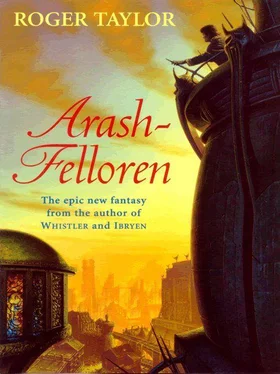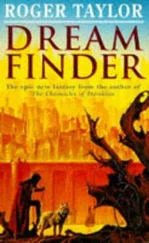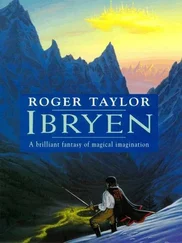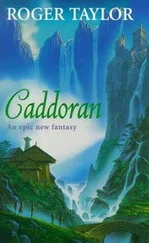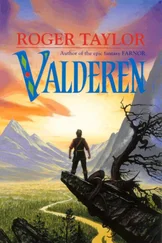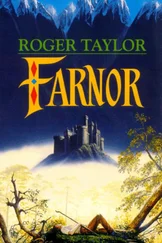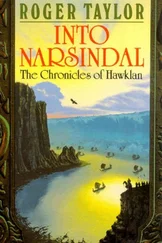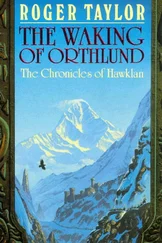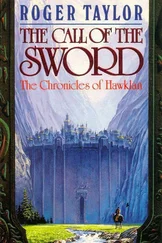Roger Taylor - Arash-Felloren
Здесь есть возможность читать онлайн «Roger Taylor - Arash-Felloren» весь текст электронной книги совершенно бесплатно (целиком полную версию без сокращений). В некоторых случаях можно слушать аудио, скачать через торрент в формате fb2 и присутствует краткое содержание. Жанр: Фэнтези, на английском языке. Описание произведения, (предисловие) а так же отзывы посетителей доступны на портале библиотеки ЛибКат.
- Название:Arash-Felloren
- Автор:
- Жанр:
- Год:неизвестен
- ISBN:нет данных
- Рейтинг книги:4 / 5. Голосов: 1
-
Избранное:Добавить в избранное
- Отзывы:
-
Ваша оценка:
- 80
- 1
- 2
- 3
- 4
- 5
Arash-Felloren: краткое содержание, описание и аннотация
Предлагаем к чтению аннотацию, описание, краткое содержание или предисловие (зависит от того, что написал сам автор книги «Arash-Felloren»). Если вы не нашли необходимую информацию о книге — напишите в комментариях, мы постараемся отыскать её.
Arash-Felloren — читать онлайн бесплатно полную книгу (весь текст) целиком
Ниже представлен текст книги, разбитый по страницам. Система сохранения места последней прочитанной страницы, позволяет с удобством читать онлайн бесплатно книгу «Arash-Felloren», без необходимости каждый раз заново искать на чём Вы остановились. Поставьте закладку, и сможете в любой момент перейти на страницу, на которой закончили чтение.
Интервал:
Закладка:
Barran looked at it and then at the rocks. His immediate reaction to the order and the surly manner in which it had been voiced was to use the hammer on his new employer – he’d killed men for less. But a twinge from his foot reminded him that he had few choices at the moment and, supporting himself on the hammer, he hobbled over to the pile.
‘How small do you want them?’ he asked, barely keeping the sarcasm out of his voice.
‘The women’ll show you,’ came the reply, as the three miners disappeared into the hut. Barran stood for a moment leaning on the hammer and staring at the closed door.
‘Work if you want to eat.’ The voice was followed by a rhythmic pounding.
He started and turned round. The women were working with their pestles again, beating out a slow, insistent tattoo. It was one of them who had spoken. He caught her eye and nodded towards the rocks. ‘Just break them?’ he asked.
‘Just break them.’
Not being able to stand, wielding the hammer proved to be no easy task, but eventually he managed to make an impromptu seat amongst the rocks from which he could work to some effect. Part of him rebelled at being obliged to do such menial and seemingly pointless work, but as he worked, he began to remember digging trenches and excavating under foundations in conditions that were far worse than this. At least no one was trying to kill him here. And, when need arose, he was good at this kind of undemanding, physical work – he just had to find his pace. The memory recalled, he gradually relaxed and was soon working with an easy rhythm, his hammer-blows counter-pointing the dull pounding of the women’s pestles.
Still, it was hot. An airless, clinging heat soon brought sweat to his brow, griming the dust there into an unpleasant grittiness. He was tempted to complain about it, but the sight of the women working on, silently and steadily, prevented him.
After a while, the reason for what he was doing became apparent. The women were grinding the rock fragments that he made into a coarse powder. From time to time one of the deep mortars that they were using would be tilted and rolled along its bottom edge to be emptied where the children were playing in the dust – except that they were not playing. Like their parents they were working, nimble fingers spreading out the dust and young eyes searching through it intently.
After some time, one of them cried out and there was a brief halt to the relentless beat of the pestles as the women broke off and went to examine some find. At the second such call, Barran swung himself upright on his hammer and hobbled across to see what was happening. At first he could see nothing, then the child twisted his hand and a bright flash between his thumb and forefinger revealed a tiny crystal. The women nodded approvingly and one of them, wetting her fingertip, dabbed it up and took it carefully over to a small pot. Seeing Barran following her, she motioned him back to his work defensively. He gave an apologetic shrug and did as he was bidden, affecting an indifference he did not feel. The sudden brightness of the crystal had cut through more than the dusty air; it seemed to have cut right through him also. Almost in spite of himself, he was intrigued.
‘That’s what you’re after is it?’ he said, as he settled himself back on to his rough seat. ‘They’re very small for jewellery. Are they worth the trouble?’
‘Jewellery?’ The woman paused and half-turned towards him, then she turned back and delicately dropped the tiny find into the pot. Her face was puzzled as she stood up. ‘Crystals are crystals. They’re all precious.’
Barran resorted to honesty. ‘I’ve never heard of such things before. What are they used for? Who wants them?’
The woman was filling a bucket with the rock fragments he had broken, throwing back on to the pile those that were too large. She looked at him with open suspicion. ‘Everyone’s heard of crystals,’ she said stonily. Barran met her gaze. Under the grime and weariness was a strong face. He decided not to argue the point. He’d find out all he needed in due course if he was patient. ‘I’ve come from far away,’ he said softly, but in a tone that ended the exchange.
The work continued as before, Barran breaking the oddly brittle rocks, the women working their pestles, and the children sifting through the dust. Barran willed his foot to heal quickly. He might be good at this kind of work but he had no desire to be doing it for longer than necessary.
There was only one more crystal found during the remainder of the day. Barran remained where he was, continuing his pretended indifference to what was happening. But this time, the women’s inspection resulted in an excitement that had not attended the previous ones. Barran craned forward discreetly to catch the ensuing conversation but heard only, ‘Ellyn, it’s a tint – I’m sure it is.’
Ellyn was the woman who had spoken to him; Aigren’s wife, he presumed. He did not hear her reply, but her manner was doubtful. She held up the crystal and moved it from side to side, peering at it thoughtfully for some time before she shook her head. There was an appeal from the first woman, of which Barran caught, ‘… a rainbow vein hereabouts… always said so.’ Then, apparently by way of compromise, the crystal was placed in a different pot to the two previous finds.
The brief snatches intrigued Barran further. What in the name of sanity was a tint? And what was a rainbow vein? That they were matters of some significance was confirmed almost immediately, for despite Ellyn’s caution about the latest crystal, the mood of the women changed perceptibly. Even the rhythm of their pounding seemed to be lighter, and from time to time they spoke to one another. Once, Ellyn gave a tight, thin smile and looked up at the sky. For an instant, Barran, who had been desperately trying to hear what was being said, saw her as the younger, more hopeful woman she had once been. The sight disturbed him.
Shortly afterwards, as the light faded, the men reappeared. In so far as he had thought about them, Barran had presumed that they had been idling the day away in the hut while he and the women did the work, but each was carrying a pannier of rocks on his back. These they proceeded to tip on Barran’s heap, making it considerably larger than it had been at the beginning. He watched them blankly.
Then the pattern of work shifted. Barran was told to continue with his rock breaking but the women and children vanished into the hut, taking the mortars and pestles and the two small pots with them. Subsequently, several more panniers of rocks were brought out but eventually Aigren came to the door and motioned Barran inside.
The door was closed behind him immediately – and well bolted too, Barran noted, as a dull thud made him turn. A heavy crossbeam had been dropped into stout brackets behind the door. What would these impoverished people need such protection for? He set the question aside, with all the others.
It took a moment for his eyes to adjust to the comparative darkness, the process not being helped by a sense of disorientation. For, what he had taken to be a large lean-to hut built against a rock face was actually only an entrance hall to a cave. Furthermore, he realized, the cave was man-made. He had done enough sapping in his time to recognize the toolmarks. Despite himself, he was impressed.
‘You cut this yourselves?’ The question came out before he had time to consider it.
‘Some,’ Aigren replied, tersely. He showed no sign of enlarging on this comment and Barran remained silent. Just how foolish these people were he had yet to decide, and until he did so, it was important that he gave away as little as possible about himself.
He looked around. The light was coming from a few oil lamps perched on ledges cut into the rock, and the air was remarkably fresh for a cave. There was even a hint of a breeze, but there was a warmth in it that was not pleasant. The wooden entrance hall was apparently used primarily as a store-place for tools. It was more substantial than it appeared from the outside, though the roof and walls were canted and twisted as though a massive hand had tried to push the whole structure over. Surely it hadn’t been built like that, Barran thought. And yet these solid rocks couldn’t move, could they? More and more questions. He pointed to a bundle of hammer handles leaning against the wall. ‘Could I use one of those for a stick?’ he asked. ‘This hammer’s a bit awkward for walking with.’
Читать дальшеИнтервал:
Закладка:
Похожие книги на «Arash-Felloren»
Представляем Вашему вниманию похожие книги на «Arash-Felloren» списком для выбора. Мы отобрали схожую по названию и смыслу литературу в надежде предоставить читателям больше вариантов отыскать новые, интересные, ещё непрочитанные произведения.
Обсуждение, отзывы о книге «Arash-Felloren» и просто собственные мнения читателей. Оставьте ваши комментарии, напишите, что Вы думаете о произведении, его смысле или главных героях. Укажите что конкретно понравилось, а что нет, и почему Вы так считаете.
